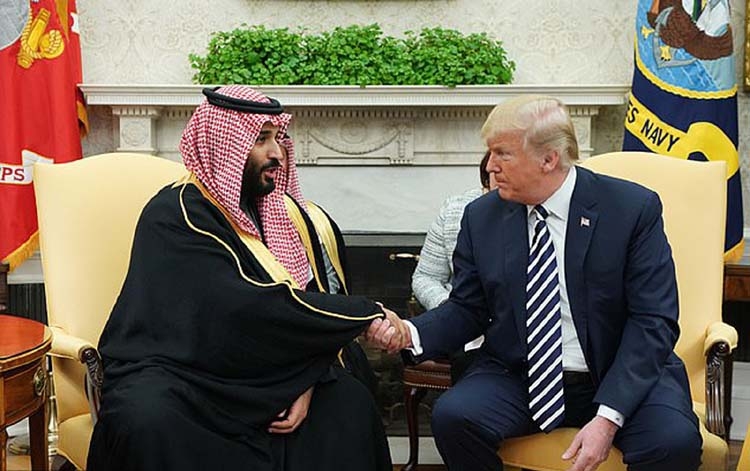Did secret nuclear talks with Trump trigger the killing of Khashoggi?

There was something of Hannibal Lecter in the gruesome murder of outspoken journalist Jamal Khashoggi in the Saudi Arabian embassy in Istanbul minus, one hopes, the cannibalism.
He was suffocated (bag over his head), throttled, fingers snipped off (probably while still alive), head and limbs hacked away by a forensic doctor wielding a bone saw (possibly while still alive), his corpse quartered then sliced into 15 pieces, reports Daily Mail.
Having stepped inside the embassy on October 2 last year, he could have been quietly disposed of, a single bullet to the head or injected with some lethal drug by the hit squad sent from Riyadh to deal with him.
Instead, in an overkill of gore, he was butchered, presumably as an example to others and so someone, somewhere, could savor the details. His disappearance, followed by a cover-up then the drip-drip of inside information revealing the grisly details of how he died, provoked international revulsion and turmoil.
All suspicion pointed at Mohammed bin Salman, known by his initials as MbS, the newish Crown Prince (and effective day-to-day ruler) of Saudi Arabia, as the instigator. Five months on, they still do despite the 33-year-old prince's denial that he had anything to do with the killing and his insistence that some of his henchmen must have gone rogue and carried it out without his knowledge.
But what has puzzled observers since the story broke was what Khashoggi had done to merit such extreme, almost medieval, retribution. He was certainly a thorn in the side of the Saudi monarchy with his criticisms.
Following a ban from public speaking imposed a year earlier, he left the kingdom for the U.S. and continued his attacks on the Crown Prince's policies in the scathing columns he wrote each month in the Washington Post newspaper. Instead, in an overkill of gore, he was butchered, presumably as an example to others and so someone, somewhere, could savor
the details
His very last one spoke of 'poverty, mismanagement and poor education' in his homeland and demanded freedom of expression rather than what he termed 'the Middle East's version of an Iron Curtain spreading hate through propaganda'.
He refused to be impressed by so-called 'modernization' programs introduced with great fanfare by the Crown Prince such as allowing women to drive and establishing a Red Sea resort where bikinis could be worn because they came with a ruthless clampdown on anyone who dared to disagree with him.
The prince tried to woo him back by offering a place at his side as an adviser, but Khashoggi rejected the advance. In a broadcast on the BBC he declared his opposition to the prince: 'One-man rule is always bad, in any country.'
But a new book on his murder hints that there was more to his death than the simple gagging of a persistent critic, albeit an influential one who was heralded as the most famous political pundit in the Arab world, with close to two million followers on Twitter.
For decades, says its author Owen Wilson, Khashoggi had been a golden boy, he and his family embedded among the power brokers in Saudi Arabia.His grandfather had been personal physician to King Ibn Saud, the founder of the nation, and he himself was a trusted asset of Saudi intelligence when he worked as a foreign correspondent in such places as Afghanistan and interviewed Osama Bin Laden.
All this raises the question of whether Khashoggi knew too much. Was he party to some damaging secret that his one-time friends in Riyadh feared he might spill unless silenced?Even more explosively, there is a suggestion one particularly hot secret might have involved one of the world's most controversial and unpredictable leaders - Donald Trump.
To Wilson it is highly significant that what caused the Saudi authorities to ban Khashoggi from publishing or appearing on TV there, thus prompting him to flee to America, was not what he was saying about the Crown Prince but because he was critical of Trump shortly after his election victory in 2016.
'The Saudi government,' writes Wilson, 'presumably saw the vain and volatile billionaire and soon-to-be president as their mark and feared Khashoggi's views might be seen as those among the royal elite.
Stung, Saudi Arabia not only forbade him from public speaking, it also issued an official Press release to distance itself from him.' He concludes: 'What he knew about Trump was so sensitive that his credibility had to be undermined at all cost.'
That Khashoggi then chose to write for the Washington Post - an avid opponent of Trump - was a particular concern. What bombshell was he going to drop next in his column?The Saudis knew, says Wilson, that the once highly-placed Khashoggi had an insight into the kingdom's long-held desire to develop a nuclear capability, as a counterweight to the nuclear bomb ambitions of Iran, its number one enemy.
He might also have been aware of Trump's keenness to sell nuclear technology to them. Such knowledge, he suggests, made Khashoggi a liability to the Saudis 'that could only be cancelled by eliminating him'.Such a scenario may appear far-fetched surely it's not in America's interest to provide nuclear know-how of any sort to the volatile Middle East region? Yet coincidentally, very recent events now show that this is something under active consideration.
